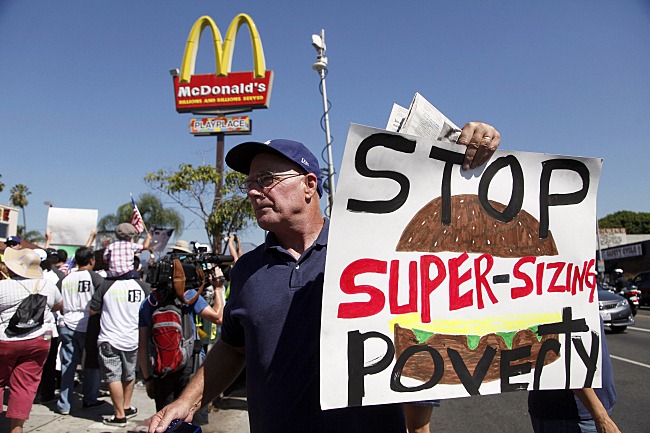Almost 60 percent of food-service workers are classified as low wage, the highest percentage in any industry. A report by the Institute for Policy Studies released in April—“Restaurant Industry Pay: Taxpayers’ Double Burden”—examines the winners and losers in an industry as American as the Big Mac.
Workers, unsurprisingly, don’t fare well.
Big corporate restaurant chains pay their workers so meagerly that more than half of the front-line, fast-food workers in the nation rely on at least one public-assistance program, such as Medicaid or the Supplemental Nutritional Assistance Program (food stamps). As a result, taxpayers contribute $7 billion a year in social-welfare subsidies to an industry that recorded $683 billion in profits in 2013.
Fast-food restaurant chains pay their workers so meagerly that more than half rely on at least one public-assistance program.
There is a second subsidy. When Congress capped tax-deductible corporate “salaries” at $1 million per executive in 1993, corporations turned to “performance-based” pay, which can be deducted from corporate income tax filings.
Over the past two years, CEOs at the National Restaurant Association’s 20 largest corporate affiliates were paid $662 million in fully deductible performance pay. Had that compensation been taxed as salary, those 20 corporations would have paid the IRS an additional $232 million.
That $232 million, for one year, would cover food stamps benefits, which average $133 a month, for 145,000 households of fast-food workers employed by the big restaurant chains.
Some of the winners.
- Starbucks CEO Howard Schultz received $236 million in deductible performance pay over 2012-2013. That’s an $82 million tax break for a chain that pays baristas an average of $8.79 an hour—admittedly higher than most fast-food employees.
- Yum! Brands CEO David Novak brought in $67 million in performance pay during 2012-2013. That’s on top of $232,622,472 in tax-deferred retirement benefits that Yum! provided Novak over 14 years. The Tax Code allows workers to defer up to $23,000 per year on 401(k) contributions. Line workers at Yum! restaurants—Taco Bell, KFC, and Pizza Hut—earn an average of $8 per hour, with taxpayers helping close the gap by providing $650 million in public assistance.
- Chipotle’s dual CEOs, Steve Ells and Monty Moran, received $47 million and $55 million in non-taxable options, respectively, and more than $20 million each in vested performance stock. Ells also exercised another $42 million in options. The combined taxpayer subsidy for the Chipotle execs for 2012-2013 was $69 billion.
- Dunkin’ Brands CEO Nigel Travis—Dunkin’ Donuts, Baskin-Robbins, Togo’s—cashed in more than $20 million in stocks in both 2012 and 2013, all exempt from corporate income taxes, saving the company $15 million in corporate income taxes.
The losers.
“Taxpayers are losing billions; shareholders are being taken for a ride,” said former Labor Secretary Robert Reich.
Workers, at the same time, are putting in 40 hours a week and qualifying for means-tested anti-poverty programs.
Source: Institute for Policy Studies
Lou Dubose is the editor of The Washington Spectator.




